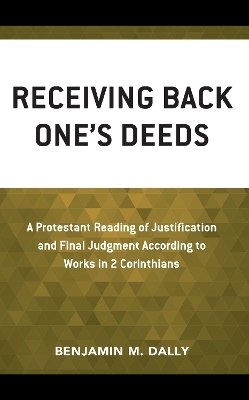
Receiving Back One’s Deeds
A Protestant Reading of Justification and Final Judgment According to Works in 2 Corinthians
Seiten
2022
Lexington Books/Fortress Academic (Verlag)
978-1-9787-0873-0 (ISBN)
Lexington Books/Fortress Academic (Verlag)
978-1-9787-0873-0 (ISBN)
This book investigates the relationship between justification by faith and final judgment according to works as found in Paul’s second epistle to the Corinthians within a Protestant (Lutheran, Reformed, Anabaptist, and Anglican) theological framework.
This book investigates the relationship between justification by faith and final judgment according to works as found in Paul’s second epistle to the Corinthians within a Protestant theological framework. Benjamin M. Dally first demonstrates the diversity and breadth of mainstream Protestant soteriology and eschatology beginning at the time of the Reformation by examining the confessional standards of its four primary ecclesial/theological streams: Lutheran, Reformed, Anabaptist, and Anglican. The soteriological structure of each is assessed (i.e., how each construes the relationship between justification and final judgment), with particular attention given to how each speaks of the place of good works at the final judgment. This initial examination outlines the theological boundaries within which the exegesis of Second Corinthians can legitimately proceed, and illuminates language and conceptual matrices that will be drawn upon throughout the remainder of thebook. Then, drawing upon the narrative logic of Paul’s Early Jewish thought-world, Dally examines the text of Second Corinthians to discern its own soteriological framework, paying particular attention to both the meaning and rhetorical function of the “judgment according to works” motif as it is utilized throughout the letter. The book concludes by offering a Protestant synthesis of the relationship between justification and final judgment according to works in Second Corinthians, giving an explanation of the role of works at the final judgment that arguably alleviates a number of tensions often perceived in other readings devoted to this key aspect of Pauline exegesis and theology.
Dally ultimately argues a three-fold thesis: (1) For the believer one’s earthly conduct, taken as a whole, is best spoken of in the language of inferior/secondary “cause” and/or “basis” as far as its import at the last judgment. (2) One’s earthly conduct, again taken as a whole, is soteriologically necessary (not solely, but secondarily nonetheless) and not simply of importance for the bestowal of non-soteriological, eschatological rewards. (3) There are crucial resources from within mainstream Protestantism to authorize such ways of speaking and to simultaneously affirm these contentions in conjunction with a robust, strictly forensic/imputational, “traditional” Protestant understanding of the doctrine of justification by faith alone.
This book investigates the relationship between justification by faith and final judgment according to works as found in Paul’s second epistle to the Corinthians within a Protestant theological framework. Benjamin M. Dally first demonstrates the diversity and breadth of mainstream Protestant soteriology and eschatology beginning at the time of the Reformation by examining the confessional standards of its four primary ecclesial/theological streams: Lutheran, Reformed, Anabaptist, and Anglican. The soteriological structure of each is assessed (i.e., how each construes the relationship between justification and final judgment), with particular attention given to how each speaks of the place of good works at the final judgment. This initial examination outlines the theological boundaries within which the exegesis of Second Corinthians can legitimately proceed, and illuminates language and conceptual matrices that will be drawn upon throughout the remainder of thebook. Then, drawing upon the narrative logic of Paul’s Early Jewish thought-world, Dally examines the text of Second Corinthians to discern its own soteriological framework, paying particular attention to both the meaning and rhetorical function of the “judgment according to works” motif as it is utilized throughout the letter. The book concludes by offering a Protestant synthesis of the relationship between justification and final judgment according to works in Second Corinthians, giving an explanation of the role of works at the final judgment that arguably alleviates a number of tensions often perceived in other readings devoted to this key aspect of Pauline exegesis and theology.
Dally ultimately argues a three-fold thesis: (1) For the believer one’s earthly conduct, taken as a whole, is best spoken of in the language of inferior/secondary “cause” and/or “basis” as far as its import at the last judgment. (2) One’s earthly conduct, again taken as a whole, is soteriologically necessary (not solely, but secondarily nonetheless) and not simply of importance for the bestowal of non-soteriological, eschatological rewards. (3) There are crucial resources from within mainstream Protestantism to authorize such ways of speaking and to simultaneously affirm these contentions in conjunction with a robust, strictly forensic/imputational, “traditional” Protestant understanding of the doctrine of justification by faith alone.
Benjamin M. Dally (PhD, Wheaton College) serves as the associate pastor/English ministry pastor at Wheaton Vietnamese C&MA church in Wheaton, IL.
1.Introduction
2.Justification and Final Judgment in the Protestant Confessions
3.The Narrative Logic of Early Jewish Restoration Theology
4.The Shape of Justification in Second Corinthians
5.Judgment according to Works in Second Corinthians
6.Conclusion and Synthesis
| Erscheinungsdatum | 27.10.2022 |
|---|---|
| Sprache | englisch |
| Maße | 157 x 238 mm |
| Gewicht | 562 g |
| Themenwelt | Geschichte ► Teilgebiete der Geschichte ► Religionsgeschichte |
| Religion / Theologie ► Christentum ► Kirchengeschichte | |
| ISBN-10 | 1-9787-0873-4 / 1978708734 |
| ISBN-13 | 978-1-9787-0873-0 / 9781978708730 |
| Zustand | Neuware |
| Informationen gemäß Produktsicherheitsverordnung (GPSR) | |
| Haben Sie eine Frage zum Produkt? |
Mehr entdecken
aus dem Bereich
aus dem Bereich
Von den Anfängen bis zur Gegenwart
Buch | Hardcover (2022)
C.H.Beck (Verlag)
CHF 47,60
Herkunft, Blüte, Weg nach Osten
Buch | Hardcover (2024)
C.H.Beck (Verlag)
CHF 55,90


